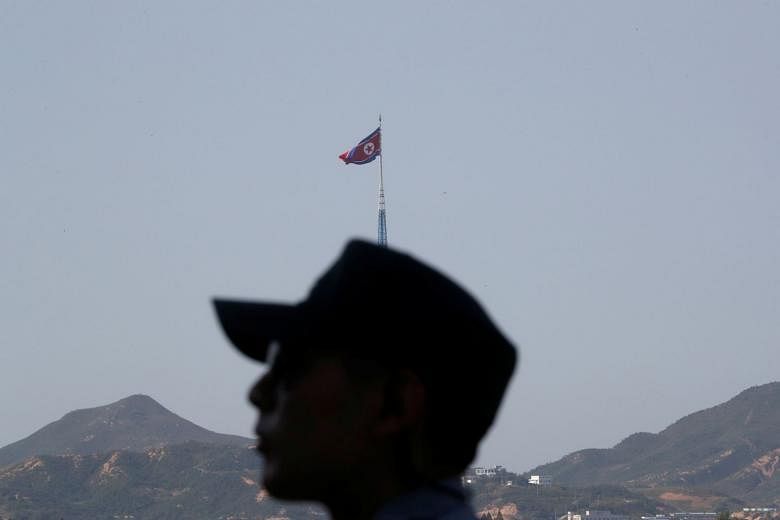SEOUL (AFP) - Tensions have remained high in the more than 60 years since North and South Korea fought a fierce war from 1950-53.
Here is a timeline of relations between the two Koreas, who remain technically at war:
WAR ENDS IN STALEMATE
On June 25, 1950, the army of communist North Korea crosses the 38th parallel, which separates it from capitalist South Korea, seizing Seoul in three days.
Beijing is Pyongyang's main backer, while Washington supports Seoul during the three-year war in which between two and four million Korean, Chinese and US soldiers and civilians are killed.
North and South Korea sign an armistice on July 27, 1953 and a Korean Demilitarised Zone (DMZ) is established near the 38th parallel. It is never ratified by a formal peace treaty, leaving the two Koreas technically still at war.
INFILTRATIONS AND ATTACKS
Since the end of the war, numerous attacks, troop infiltrations and clashes, mostly provoked by Pyongyang, have threatened the fragile ceasefire.
Pyongyang has on several occasions placed its troops on a war footing:
January 21, 1968: a team of 31 North Korean commandos is sent to Seoul to assassinate President Park Chung Hee, but is intercepted by South Korean security. All but two are killed, and only one of those captured.
August 18, 1976: North Korean soldiers attack a work party trying to chop down a tree inside the demilitarised zone. Two US army officers are killed in what becomes known as the "axe murder incident".
October 9, 1983: An attempt to kill South Korean President Chun Doo Hwan takes place when North Korea plants a bomb in a mausoleum in Yangon, Myanmar during a visit by Chun. He survives but 21 people, including some government ministers, are killed.
November 29, 1987: A bomb planted on a Korean Air flight explodes over the Andaman Sea, killing all 115 people on board. Seoul accuses Pyongyang, which denies involvement.
September 18, 1996: A North Korean submarine on a spying mission runs aground off the eastern South Korean port of Gangneung. After a 45-day manhunt, 24 crew members and infiltrators are killed.
DIRECT CONFRONTATION
June 15, 1999: South Korean and North Korean naval ships clash off South Korea's Yeonpyeong island. North Korean casualties are estimated at around 50.
March 26, 2010: The South Korean corvette Cheonan sinks, killing 46 sailors. An international investigation concludes it had been torpedoed by a North Korean submarine. Pyongyang denies the charge.
November 23, 2010: North Korea fires 170 artillery shells at Yeonpyeong, the first attack on an area populated by civilians since the war: four are killed, including two civilians. South Korea's troops fire back with cannon.
August 20, 2015: South and North Korea trade artillery fire across their border.
PYONGYANG'S NUCLEAR AMBITIONS
North Korea has steadfastly pursued development of its nuclear programme and ballistic missiles capable of hitting targets in Japan, South Korea, and the United States.
October 9, 2006: It carries out its first successful nuclear test. Since then it has come under a series of international sanctions.
In 2017, Pyongyang multiplies its ballistic missile tests and on September 3 carries out its sixth and biggest nuclear test to date amid a verbal escalation between the US President Donald Trump and the North Korean leader Kim Jong Un.
September 21, 2017: South Korea's new President Moon Jae In tells the United Nations he does not want the "collapse" of North Korea but warns against tensions becoming "overly intensified" and "accidental military clashes".
November 2017: Seoul imposes new unilateral sanctions, putting 20 North Korean organisations including banks on a blacklist. The measures are in addition to fresh sanctions by the UN.
NORTH AGREES TO TALKS
January 3, 2018: the Koreas reopen a cross-border hotline, shut down for two years, after Kim Jong Un suggests Pyongyang could send a team to next month's Winter Olympics in the South.
January 5, 2018: North Korea accepts the South's offer of talks to take place on January 9, the first since 2015.

